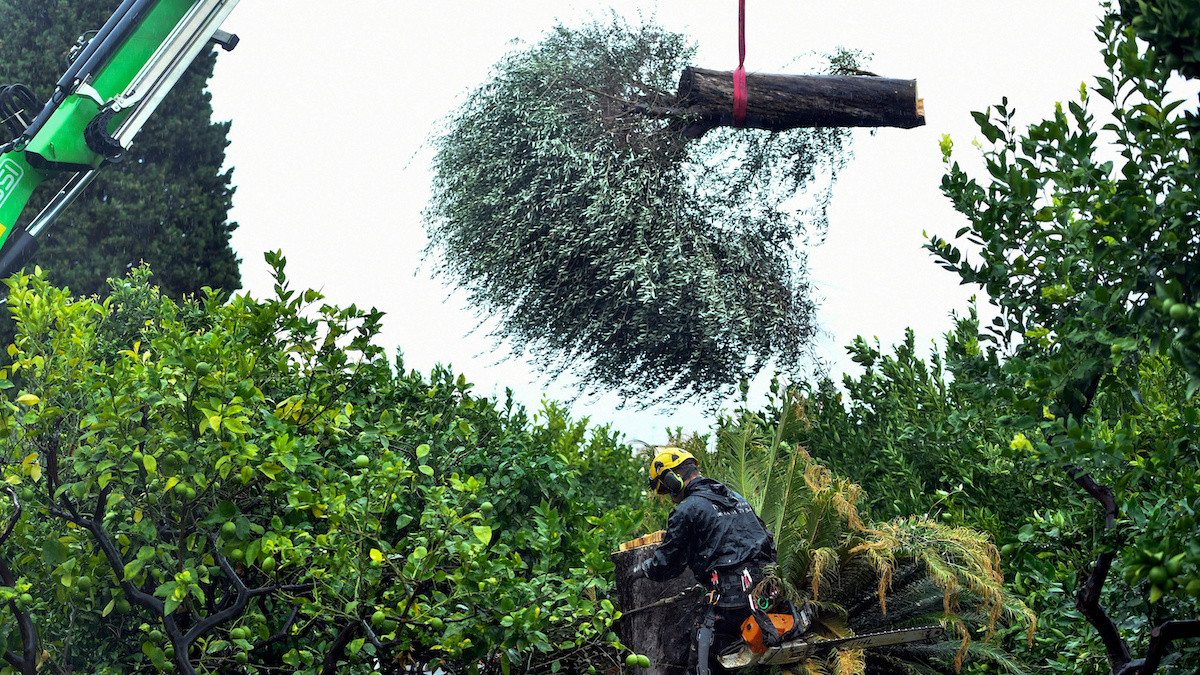

An olive tree infected with Xylella fastidiosa is removed from the garden of the Palais Carnoles after being cut on Sept. 10, 2019 in Menton, southern France. YANN COATSALIOU / AFP via Getty Images
A deadly pathogen is spreading across olive trees in Europe and may cause over $20 billion in losses and increase the price of olive oil, according to the BBC.
The bacteria, Xylella fastidiosa, is spread by sap-sucking insects known as spittlebugs. It is considered to be one of the most dangerous plant pathogens in the world, and it has already created huge problems in Italy and Spain where it has decimated entire groves of ancient olive trees, as The Independent reported.
According to experts, the bacterium is capable of destroying not only olive trees, but it also preys upon more than 300 species including lavender, rosemary, almond, plum and cherry trees. There is no cure for a Xylella infection, according to the BBC.
A new study published in the Proceedings of the National Academy of Sciences found that the infection could cost Italy over billion over the next half century. Already, the bacterium has wiped out more than 1 million trees in Italy. Spain could suffer over billion in losses and Greece will face another billion in losses. That is assuming the infection continues unabated and replanting is impossible, as The Guardian reported. Together, Spain, Italy and Greece account for 95 percent of Europe’s olive oil production.
“The damage to the olives also causes a depreciation of the value of the land, and to the touristic attractiveness of this region,” said Dr. Maria Saponari, from the CNR Institute for Sustainable Plant Protection in Italy, as the BBC reported.
“It’s had a severe impact on the local economy and jobs connected with agriculture.”
Olive trees, which are sensitive to temperature fluctuations, are already at risk to extreme weather caused by the climate crisis, including heatwaves, drought and flooding. In 2019, Italy saw a 57 percent decrease in its olive harvest, which scientists attributed to the climate crisis, as The Guardian reported at the time.
The Xyllela infection restricts the tree’s ability to move water and nutrients and over time it withers and dies, according to the BBC.
The research team, led by Dr. Kevin Schneider from Wageningen University in the Netherlands, said that drastic action is required to stop the spread of the disease. That may include downing healthy trees to prevent the bacterium from jumping from one tree to another, according to The Independent.
“Even under slow disease spread and the ability to replant with resistant cultivars, projections of future economic impact in affected countries run in the billions of euros,” the authors write. “Our findings highlight the importance of minimizing disease spread and implementing adaptation measures in affected areas.”
The researchers found most current olive production in Italy, Spain and Greece falls within the range of climates in which the bacterium can be expected to flourish. In fact, somewhere between 85 and 99 percent of all producing areas are susceptible, as The Guardian reported. The disease is spreading at a rate of 5 kilometers (approximately 3.1 miles) per year, but can be slowed to 1 kilometer per year if appropriate measures are taken.
Unfortunately, some of those measures have been emotionally difficult. The researchers noted that when felling healthy trees was tried before, it “resulted in great societal unrest in the affected region,” according to The Guardian.
“You really hear devastating stories of infected orchards that were inherited over generations,” said Schneider to the BBC. “It’s the same orchard that their grandparents were once working on. So how do you put an economic number on the loss of something like this? The cultural heritage value would be far larger than we could compute.”
Schneider told The Guardian that farmers and governments in the affected regions should heed scientific advice. “Farmers need to stay vigilant and adhere to the imposed mitigation measures. Government interventions are warranted with regard to economic considerations, and government support for adaptation strategies, such as [developing and propagating] resistant varieties, is important.”
- Why Extra Virgin Olive Oil Is the Healthiest Fat on Earth - EcoWatch
- 12 Benefits and Uses of Cold Pressed Olive Oil - EcoWatch

 233k
233k  41k
41k  Subscribe
Subscribe 